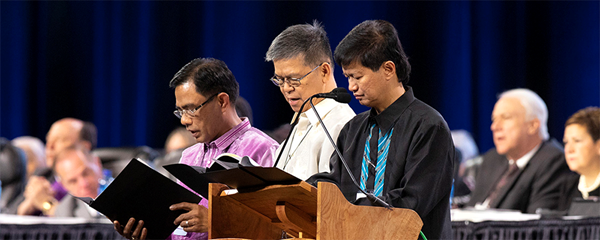After heated debate, the Philippines Central Conference’s coordinating council voted to extend the episcopal leadership of the country’s three incumbent bishops through the end of 2021.
Your support of the Episcopal Fund apportionment helps pay the salaries and benefits of United Methodist Bishops and allows them to travel across their episcopal areas providing mentorship and leadership.
Extending the bishops’ terms sparked controversy over the authority of the Philippines Central Conference as an independent body and on whether the action violates church law. The coordinating council acts on behalf of the conference in between its quadrennial sessions. This year’s Philippines Central Conference was delayed along with General Conference due to the global pandemic.
In the Philippines, bishops are elected every four years. They can be re-elected as long as they have not reached the age of 66. Bishop Ciriaco Q. Francisco, who oversees the Manila area, was set to retire in 2020 under the mandatory age limit, while Bishop Rodolfo A. Juan of the Davao area had announced his plans to retire voluntarily after serving three terms. Pedro M. Torio Jr. of the Baguio area had not yet announced his plans after serving two terms.
In a letter, the trio challenging the extension stated that the Council of Bishops cannot override the rules of the Philippines Central Conference. “It is a matter of respect in responding to its contextual situation,” the letter said.
The Rev. Egmedio B. Equila Jr., clergy delegate from South Nueva Ecija Philippines, was one of the three who signed the letter.
“The law provides an answer in case of any emergency like this pandemic crisis,” he said, citing the provision from the Philippines Central Conference Discipline Paragraph 49. “There is a legal remedy in any emergencies that result in a vacancy in the office of bishop, that is, for the Council of Bishops to assign a bishop to fill such vacancy.”
He said violating the church’s law is not good for its future.
“(The) U.S. has its own jurisdictional laws; we have Philippines Central Conference laws that we should abide by and respect,” he said.
However, some argued appointing retired bishops wasn’t in the best interest of the church or the bishops themselves.
Malana, from Northern Philippines, said the decision to extend the terms was made to guarantee that there would be no leadership vacuum created. The committee consulted with the Philippines College of Bishops and the Council of Bishops through Bishop Kenneth Carter, former Council of Bishops president and leader of the Florida Conference, on the retirements of Bishops Francisco and Juan, according to the report.
The retirements “were seen in the context of the extraordinary (and unprecedented) situation where no General Conference and central conferences would be held this year,” the report said.
The Rev. Jonathan Ulanday from East Mindanao Philippines, who also signed the opposition letter along with layperson Olive Beltran, said the ruling left more questions than answers.
He said the power of the delegates to legislate and mandate cannot be taken over by the coordinating council. “The action of the (council) is ripe for a judicial review,” he said, adding that it should be resolved with prudence.
Malana said he does not believe the Committee on Episcopacy’s recommendation infringes on church law but recognizes that the issue is constitutional, unprecedented and could come within the jurisdiction of the church’s judicial bodies, either by the Judicial Court of the Philippines Central Conference or the denomination’s top court.
excerpt froy a story by Gladys P. Mangiduyos, communicator from the Philippines.
One of seven apportioned giving opportunities of The United Methodist Church, the Episcopal Fund pays for bishops’ salaries, office and travel expenses, and pension and health-benefit coverage. Please encourage your leaders and congregations to support the Episcopal Fund apportionment at 100 percent.





